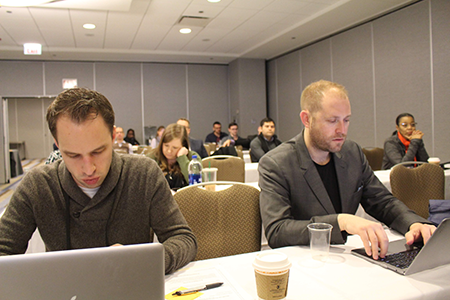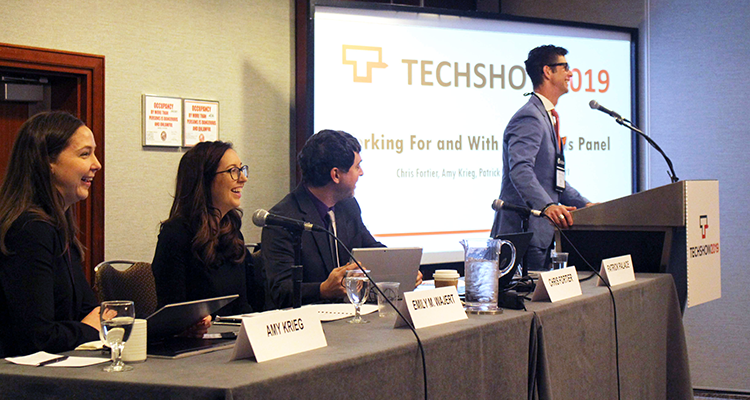Millennials are poised to take over; how will the legal industry need to change?

Image from Shutterstock.
In 10 years, 75 percent of law firm staff will be millennials.
“That’s interesting,” said Patrick Palace, owner of Palace Law in Tacoma, Washington, and moderator of Friday’s ABA Techshow panel “Working For and With Millennials.”
“There are a lot of people out there who may have some issues with millennials and say they don’t want to work with them, but the reality is we can’t work without them,” says Palace. “They are the dominant force.”
This is somewhat unsurprising, given that the youngest people Pew Research Center considers part of the millennial generation are 22 years old, and the oldest millennials are turning 38. The panel offered key takeaways for attracting millennials as both employees and clients. Most notably, millennials with law degrees are more racially diverse and poorer than previous generations.
Amy Krieg, an attorney and compliance officer for Habitat for Humanity of Huron Valley in Ann Arbor, Michigan, said that as a group, millennials have the most post-graduate degrees and higher education than any previous generation.
She pointed out that there is a cost to that education—most lawyers are coming out of law school with six-figure debt. That not only makes it difficult for them to save money, she said, but also factors into the types of jobs and salaries they will accept after law school.
 Lawyers from several generations were in attendance at the panel. Photo by Adam Music.
Lawyers from several generations were in attendance at the panel. Photo by Adam Music.The Public Student Loan Forgiveness program, which pays off any loans that remain after 10 years in exchange for work with a nonprofit or government organization, has been particularly attractive to millennials, Krieg said.
“I can get such a better deal on my student loans,” she said. “You have to keep that in mind as a small firm—you are competing with public service organizations.”
Emily Wajert, an employment associate at Kramer Levin Naftalis & Frankel in New York, added that since millennials have significant student loan debt, they also care about how much money they will make in the future.
She cautioned the audience to be transparent with their millennial lawyers about their pay-scale and potential growth opportunities.
Since many large law firms offer similar salaries to millennial lawyers, she said, they need to provide other benefits—such as bonus-eligible work, mentoring opportunities, inclusive firm cultures and flexible schedules—to stand out.
“To the extent you can think outside the box, there is more you can do to attract the key millennial talent that your firm needs,” Wajert said.
Chris Fortier, an attorney-adviser with the Social Security Administration’s Office of Hearing Operations in Falls Church, Virginia, added that law firms should have early conversations with millennials about what is expected of them and what they can do to earn larger bonuses.
He suggested that the conversation take place during a bigger discussion about the firm’s strategic plan and where millennial lawyers fit into the future of the firm.
“Having that discussion firm-wide and with your clients would do you a great service and go a long way to retaining your workforce if they see their role specifically noted out in a strategic plan,” he said.
Another key takeaway offered by the panel is since millennials are more diverse than previous generations, they expect everyone to be treated equally and to see people of all different backgrounds in law firms.
“Not only are your clients going to be racially diverse, but if you are working with someone who identifies as white, their friends are going to be racially diverse as well,” Krieg said. “They will be just as sensitive to things that are said and how things are handled. You should be politically correct and be respectful.”
Fortier encouraged the audience to create a firm culture where attorneys greet and hold doors for one another, invite associates to lunch or happy hour, and treat them as equals. Millennials value these actions, he said, and will stay with firms that incorporate them.
“When you are at a meeting and have someone next to you, you can refer to them as a co-worker or a colleague, as opposed to my associate,” he said. “That puts the younger attorney on notice that my partner sees me as an equal in this situation. I need to contribute, I need to step up.”
The panel also stressed that law firms should be proficient with social media and search analytics, and ensure that their websites are enticing and dynamic.
“Millennials are digital natives, so they have little patience for things that take more time,” Wajert said. “If you can offer the most advanced technology, that is something millennial clients are looking for and will appreciate.”
 Millenial lawyers and clients will be more diverse than in previous generations, panelists at the “Working For and With Millennials” session said. Photo by Adam Music.
Millenial lawyers and clients will be more diverse than in previous generations, panelists at the “Working For and With Millennials” session said. Photo by Adam Music.
Follow along with our full coverage of the ABA Techshow 2019.
Write a letter to the editor, share a story tip or update, or report an error.


